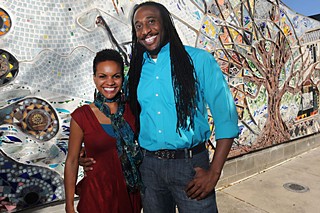We Need to Talk
Food for Black Thought is changing Austin's culinary conversation
By Jessi Cape, Fri., Dec. 19, 2014
It's dinner time in Austin, but in the din of the community conversation, not everyone's voice is being heard. Not everyone even has an invitation. Food for Black Thought is looking for change. The data-driven, wellness-centric activists are creating critical solutions to understanding the junction between race and local food, so we can start to mend the sometimes tense relationship.
"Is it helping everybody in the community?" asks co-founder Naya Jones. "Is it only helping certain parts of our community? Who is it serving? Asking the questions without blame, but with analysis, is really important and we feel that that could be done more in Austin to create an atmosphere of people really benefiting from local food and local farms, too."
Jones and life partner Kevin Thomas founded Food for Black Thought to create a more inclusive conversation. "We started to look around Austin and saw so much activity and action going on around food justice, but the voices that we heard and bodies that we saw that were really involved weren't really the people that were greatly impacted by the issues, by the policy that was being thrown around," says Thomas. Jones adds, "We both come from working-class backgrounds and we're first-generation college students as well. We bring that understanding of food insecurity from a very personal place to this work."
Tackling the intersectional issues of gentrification, urban change, agricultural history, and cultural perception demands a diverse round table. It's about "getting a full picture of the food landscape," says Thomas. Food for Black Thought is casting a wide net.
Speaking Terms
At his 2014 SXSW Eco keynote, environmental justice leader Dr. Robert Bullard said that zip code is the best predictor of health and quality of life. Jones agrees, but adds that language is crucial to the discussion. Many of the terms – though rooted in good intentions – are inadequate and inaccurate. "The issue with the term [food] desert is that it may not capture how neighbors are sharing food with each other."
The platform provided by FFBT opens the floor for discussion and draws a diverse crowd, essential to understanding non-retail food commerce. "Whenever we're having workshops and there's diverse communities in the room, especially black and Latino communities, people always talk about their grandmothers, or abuelitas, cooking food and sharing with the neighborhood ... And also the importance of food selling, especially among black women and Latina women – selling food that's not sold at the supermarket but just to your neighbors. It's a very familiar kind of transaction. In Austin, it's underground."
Thomas, drawing from his marketing expertise, explains that many of the solutions being offered – a new strategically placed supermarket or farmers' market, for example – are not necessarily as effective as asking residents about alternative kinds of food economy they want to see in their neighborhood, ones that market forces may not consider.
Jones and Thomas say it's also important to understand the difference between personal responsibility and systemic issues. While many groups are tackling some of the up-front groundwork, FFBT suggests that it's got to go deeper to make real change. "Yes, we can start something in our front yard, but at the same time understand why you don't have a retailer in your neighborhood in the first place," Jones says. The idea that an entire group of people is eating the wrong food is particularly problematic, especially when many foods simply aren't available in a geographic region. If cultural eating patterns are up for discussion, "we also have to talk about changing the institutions and the way things work," says Thomas.
Understanding personal relationships with food is key. "A lot of times, African-Americans can be told there's issues around eating bacon, or issues around eating these so-called soul food items. But there are places in the Eastside popping up where you can get bacon donuts and bacon ice cream. It's celebrated in those communities whereas it's demonized when you put it in a black context," Thomas says.
Because Travis County's black community is statistically vulnerable to serious health issues – cancer, heart disease, and diabetes – many groups are jumping in to try to help. "But what often happens because there is a lack of understanding of black history, of a long history of producing food, of knowing food, of cooking healthful food, black communities are approached as novices ... rather than as a community who is reclaiming knowledge. And that is a huge and powerful shift that we really emphasize," says Jones.
Show and Tell
If shaking up a food system requires an entry point, teach the kids. According to FFBT, children are uniquely positioned to impact all age groups, and with some training they can become "community ambassadors." Using critical analysis, Jones and Thomas are focusing on developing curricula ranging from youth-oriented programs to farm-based experiences.
Max Elliott, co-founder and executive director of Urban Roots, explains how Jones and Thomas are branching out: "When Grow Dat Youth Farm, one of our partner youth farming organizations in New Orleans, visited Austin last summer, I invited Naya to share FFBT's unique youth development food justice curriculum with these youths from New Orleans. Many of the Grow Dat youth remarked that the FFBT training was the most meaningful part of their trip to Austin. Subsequently, Grow Dat and the Rethinkers, another youth organization in New Orleans, invited Naya and Kevin to New Orleans to facilitate youth food justice training."
Jones and Thomas host annual symposiums, frequent workshops, holistic wellness events, and skill-sharing activities, where people are able to share resources and tips on a variety of topics from where to get seeds to how to save money. FFBT also recently held an event with Rootwork's newest venture, Black Gaia, which swirls together hiking, meditation, black diaspora history, and sustainable food resources, and aims at communities of black women, queer people of color, and college students. They're also partnering with local host farms, such as Heirloom Blooms near San Marcos. By focusing on groups with high disparities and long legacies of food production, they can "really start making those synergies so that communities' members of color and people from diverse groups are accessing local food, visiting these farms, and also learning about history that we can reclaim," says Jones.
Perhaps their most monumental endeavor so far is a food-centric community survey gaining info in Spanish and English from scholars, students, and community members with the help of Sustainable Food Center, Rosewood Community Market, and Travis County Health and Human Services. They're not keeping these game-changing findings to themselves, though. "We're also releasing a toolkit [that will] allow people across the country and around the world through our website to create a participatory survey that asks fresh questions about food access in kind of a unique, powerful way," says Jones.
Taking an all work, no play approach, however, is counterproductive. Thomas explains, "I think so often people feel ashamed or that it's frivolous to take time to recharge yourself, and that there's always more building to do and more motivational work to do. We're trying to reframe that. It's part of the work, part of the building, part of the organizing, part of the social justice foundation." Jones adds that "we're really excited to approach food justice and food work from a more holistic perspective – in all senses of the word – meaning mind, body, and spirit. Healing work is justice work, and justice work is healing work.
"Those of us who are in the movement," she continues, "specifically speaking about people of color and black folks in the movement, are reminded by events like what we've experienced with Ferguson and Michael Brown, Trayvon Martin, and Renisha McBride, we're reminded constantly that we're not valued by society. How powerful is it to take care of ourselves while moving energy and creating change? We think that that is what makes the work sustainable and that that's the difference between reacting and actually building a movement."









